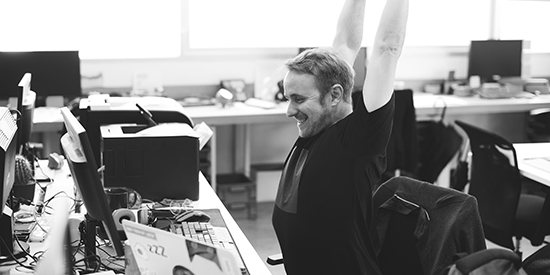Deakin mega-study shows sitting not so bad for back pain
Media release
In good news for those with desk jobs, a new Deakin University mega-study into the causes of back pain has found no association between prolonged sitting and lower back pain.
The 'umbrella review' led by researchers in Deakin's Institute for Physical Activity and Nutrition (IPAN) sifted through 41 different systematic reviews to better understand what movements or tasks are risk factors for back pain.
The findings, published in this week's edition of the Journal of Biomechanics, are the result of three decades of data collection from more than one million subjects, giving the most accurate picture yet of the relationship between certain activities and back pain.
IPAN Associate Professor of Exercise and Musculoskeletal Health Daniel Belavy said when looking at the studies in combination, the strongest evidence his team found was actually the absence of a relationship, with no association between prolonged or occupational sitting and lower back pain.
"Despite a growing body of evidence linking sitting to other negative health effects, when it comes to back pain sitting does not appear to be a risk factor," Associate Professor Belavy said.
"So while you may get muscle tightness when you sit for a long time, sitting itself doesn't actually damage the spinal structures directly."
But it's not good news for all workers. Associate Professor Belavy said heavy physical work and lifting were associated with back pain in his review, although it's still not clear that they are actually likely to cause it.
"Both of those things might sound the same, but it's one thing to find an 'association' and quite another thing to prove 'causality'," he said.
"Studies on 'causality' are few and far between because they are harder to do. So it's important we keep working to better understand the mechanisms behind lower back pain.
"For those under 50, back pain causes the greatest loss of productivity of all diseases in Australia, and 16 per cent of Australians will develop persistent back pain at some point in their life."
Associate Professor Belavy said despite sitting time not seeming to be an issue for back pain, there were still plenty of reasons why it was good to break up long bouts of sitting.
"From other work, we know that general physical activity is important for reducing the risk of back pain," he said.
"Those who are physically active, but not involved in heavy workloads or high-level sporting pursuits, are typically at the lowest risk of experiencing back pain.
"And we know from other research conducted within IPAN and elsewhere that reducing time spent sitting lowers the risks of other chronic conditions. So those in office jobs shouldn't get too comfortable at their desks just yet."

